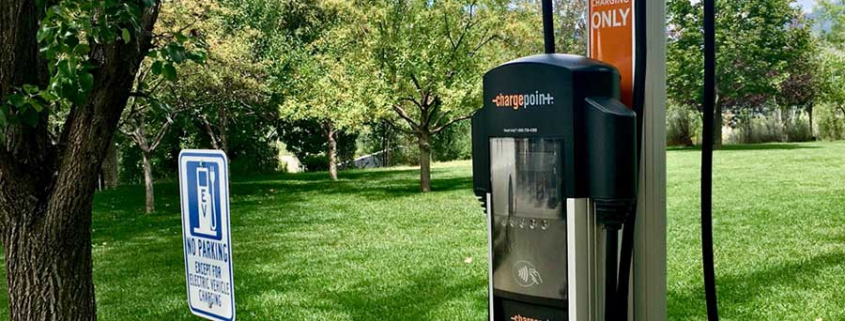Charging Ahead in Colorado
Coaches, new funding, bring EVs, charging stations to rural areas
By Laurie E. Dickson
You may have heard the buzz about electric vehicles and charging stations in Colorado. Maybe you have seen charging stations at your corner store, the local electric co-op or your workplace. Charging stations and EVs are becoming more common, popping up all around the state.
There is an ongoing effort across Colorado to reduce emissions and provide options for clean transportation. In 2019, Colorado became the first state in the central U.S. to adopt Zero Emission Vehicle standards for cars and trucks, ensuring a reduction in harmful emissions and providing economic benefits for its citizens. Gov. Jared Polis issued an executive order supporting a transition to zero emissions and accelerating the electrification of cars, buses, trucks and other vehicles with a goal of achieving 940,000 EVs on the road by 2030.
What’s being done to increase the adoption of EVs and meet the goals in Colorado? One way is through the ReCharge Colorado program, started in 2014 through the Colorado Energy Office.
The original goal was to encourage alternative and clean transportation. ReCharge Colorado has evolved to be the program that advances the adoption of EVs and installation of charging infrastructure across the state.
“The state of Colorado has set ambitious goals for EVs,” says Matt Mines, senior program manager in transportation fuels and technology at the Colorado Energy Office.
“ReCharge Colorado coaches provide a critical link to local communities to connect our EV programs with local needs,” he notes. “Direct education and outreach, such as that provided by the ReCharge coaches, are a crucial aspect to ensuring the benefits of transportation electrification are understood and materialize throughout the state.”
There are five ReCharge regions in the state, each with a ReCharge coach who provides free, impartial advice; EV education; offers community workshops and grant writing assistance; promotes EV adoption through group buys; and supports auto dealerships with education and opportunities. Every county in the state is represented by a ReCharge coach.
Coaches know their territories and can provide the best solutions for the communities where they serve. By working with Colorado communities, ReCharge coaches help create an ecosystem of broad support along with the education necessary for a successful transition to EVs.
“Working as a ReCharge coach allows me to better get to know the communities where I live and play — and to talk to local business owners, employers, and property managers about how they can provide a public benefit in the form of EV charging stations,” says Sonja Meintsma, the ReCharge coach for Denver Metro Clean Cities and the Colorado Springs region.
“As Colorado’s EV ownership grows and we work toward reaching the statewide goal of getting 940,000 EVs on the road by 2030, access to public chargers across the state, including in rural, underserved and high emission areas, will be essential. As a coach, I feel I am making a tangible impact on our state’s ability to improve local air quality, reduce climate-altering emissions, and meet the needs of EV drivers in the state,” she adds.
ReCharge coaches provide consultation for interested businesses and communities regarding the design and technical requirements needed to install charging stations. For example, is the location best suited for Level 2 charging stations or a faster DC Fast Charger? Is there electrical service available at the location and is it sufficient to power an EV charging station? It’s the job of the coaches to know the incentives, federal and state tax credits, as well as the utility member co-op rebates available in their territories that can offset costs.
Kathy Woods, director of economic development for the city of Alamosa, comments, “I’ve had several opportunities to work with our ReCharge coach. From answering questions, to assessing feasibility, to celebrating with us upon completion of projects, the coach is right by your side and very helpful. ReCharge coaches are great partners.”
There is a concerted effort across the state’s ReCharge regions to increase the charging infrastructure along all major highways and byways. Electrifying Colorado’s Scenic Byways is a goal the ReCharge coaches work to attain. There are 26 Scenic and Historic Byways in the state. Electrified Byway designation guarantees that when you drive on our mountain highways, you can make the journey without worrying about the next charging station location.
By now, we’ve all heard about the Infrastructure Investment and Jobs Act signed in November 2021. The bill includes funding at the federal and state levels for EVs and the charging infrastructure needed to support EV deployment. State and local governments will benefit from $7.7 billion dedicated to the deployment of EVs and related infrastructure.
The bill also dedicated $12.7 billion to the deployment of all types of clean vehicles and fueling infrastructure, including EVs and charging infrastructure and $10.3 billion for grid and battery-related investments.
With gas prices soaring and funding support for investing in EV technology, it’s a great time to invest in the charging infrastructure that makes driving EVs everywhere in Colorado feasible. A ReCharge coach can recommend options for any local community or business and connect you to funding opportunities as you make the transition to zero emission vehicles and the new energy economy.
Laurie Dickson is the executive director of the nonprofit, 4CORE (Four Corners Office for Resource Efficiency) and the ReCharge coach for southern Colorado. Visit energyoffice.colorado.gov/zeroemission-vehicles/recharge-colorado to learn more about ReCharge Colorado.

